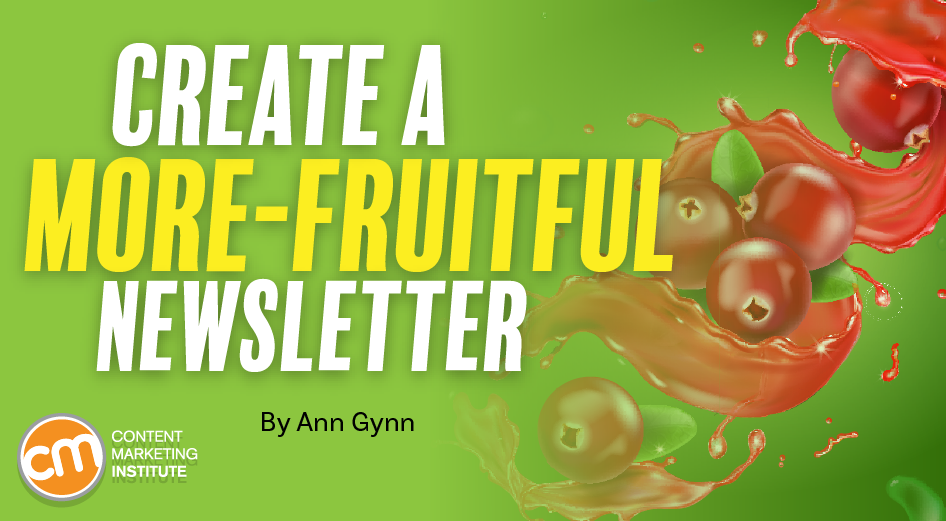
I’ll let you in on a little secret.
I volunteer to bring the cranberry relish to the end-of-the-year holiday meals. It’s the easiest to cook on the list of dishes at our family table, and I’m a fan of the fruit.
So last Thanksgiving, Ocean Spray’s Cranberry Club promotion intrigued me. How could a brand with a famous seasonal product create a year-round club? Since it was free, I signed up.
Seven months later, I realized the Cranberry Club is just a newsletter.
Though the Cranberry Club didn’t deliver on the promise of community, it did deliver good newsletters that offer great lessons for content marketers at any B2B or B2C brand, particularly those with seasonal products or once-a-year events.
@OceanSprayInc’s #CranberryClub didn’t deliver on its promise of community, but it did deliver good newsletters, says @AnnGynn via @CMIContent. #EmailMarketing Click To Tweet
Pace your content
Ocean Spray sent a welcome message and four newsletters between my sign-up date (Nov. 23 – the Wednesday before U.S. Thanksgiving) and Dec. 31, 2022. Starting in January, it sent an email once a month.
That makes sense. I’m not as interested in cranberries in January, February, March, etc., so the content isn’t as relevant. Though industry best practices indicate the importance of sending newsletters at regular intervals, that doesn’t necessarily work for businesses with buying cycles entrenched in the calendar.
Tailor your content to the product calendar
Ocean Spray does well at tailoring the content to the newsletter’s distribution time. In January, for example, it reacted to the season of diets and being healthier with its diet cranberry drink entry. In February, the newsletter discussed the wintry weather: “If Ocean Spray® can make a Diet Cranberry Juice Drink with 5 calories and full flavor — then you cran work from home in real pants. #AllThatPower.”
(I wonder if it used the snowy language for all recipients. If so, that’s a mistake since snow doesn’t fall in many geographic areas in February.)

(Side note: I’m not a fan of brands creating new words like “cran” instead of “can” and “cranfident” instead of “confidence.” It’s a little too over the top, too promotional for me.)
In March, Ocean Spray did a contest for its new products. By April, though, Ocean Spray seems to have run out of juice. Its primary image was a product shot of its Craisins, and the text was all promotional: “Florals for spring? Groundbreaking. Spring salad with Craisins? Revolutionary. Take your classic spring recipes from basic to bold with Craisins® Dried Cranberries. Because they make anything just hit different.”

See? It’s all production promotion. Even the writing lacks pith. As a Cranberry Club member, I was disappointed and would have unsubscribed if not for my content marketing interest.
Deliver the expected
Breaking out of the standard content box is a good thing as long as you don’t go so far that you disappoint the audience. At a food-based business like Ocean Spray, subscribers would likely expect recipes. The Cranberry Club doesn’t disappoint. It shares unexpected drink recipes – sultry sunset sangria, cran-mango™ margarita, pink lemon drop, and mixed berry smoothie, only one of which even mentions an Ocean Spray product in the name.

Don’t break out of the box so far that you don’t deliver the #content your audience expected when they signed up, says @AnnGynn via @CMIContent. #EmailMarketing Click To Tweet
Don’t spill all the beans (or cranberries)
Ocean Spray wants its Cranberry Club members to visit its website, where more interesting content – not just production promotion – awaits. It incorporates a call to action for every entry in the newsletter.
This article engages readers with the company’s history, which started with three maverick farmers and turned into a nationwide cranberry collective of 700-plus farmers. That’s a smart strategy – in addition to inviting them to “learn more,” they tell the brand story from a more compelling human perspective.

Here’s another example where they admit that cranberry’s taste might not be everyone’s first choice.

Ocean Spray then sends those who appreciate its status as a superfruit to a website page with more information on the powerful berry.

TIP: Acknowledging not everyone loves your product is helpful because readers will recognize your brand lives in the real world, not the promotional one where everybody loves the product.
Personalize in unexpected places
McKinsey research finds 71% of consumers expect companies to deliver personalized interactions, and 76% get frustrated when that doesn’t happen.
Many brands think they’ve created that personalization by adding “Dear [FIRST NAME],” at the top of your newsletter. Ocean Spray doesn’t do that traditional personalized insert. It surprises the subscriber by using their name inside the content, such as this snippet about cran facts that included the last lines: “The potential little puckers possess uncanny nutrition, including powerful nutrients, vitamins, and antioxidants that support it all. Bladder stuff. Gut stuff. Heart stuff. (And a lot more stuff.) The cran’s got you, Ann.”

In another newsletter, it boasts a new flavor of its drinks and includes the sentence: “Real fruit juice from cranberries, lemons, and raspberries, we got you, Ann,” followed by a wink emoji.

By incorporating the recipient’s name throughout the content, you’re more likely to grab their attention when they skim the content.
Personalize #content in unexpected places in your newsletter to grab the subscribers’ attention, says @AnnGynn via @CMIContent. #EmailMarketing Click To Tweet
Create an experience better than Ocean Spray
OK, that’s all the great stuff Ocean Spray does with its Cranberry Club. You’ll notice, though, it’s all about the club’s newsletter. And frankly, that’s the disappointment. I never really joined a club. The welcome message when I joined the Cranberry Club told me that. Though it refers to me as a “certified member of our cran fam,” this family never gets together – not even during the holidays. The opening email simply regurgitates what I’ll find in the newsletter and lists the social channels that I can follow.

That’s a big miss. Ocean Spray chose a word – club – that indicates community. Many people sign up and expect to join a community, not just subscribe to a newsletter. Imagine what Ocean Spray could do by hosting a private community where Cranberry Club members can gather, talk about cranberries, access special cooking demonstrations, and share their lives.
Oh, in case you thought it’s hashtag #AllThatPower might net a community feeling on social channels. It doesn’t. First, the hashtag is generic and doesn’t connect to the brand (Ocean Spray) or its primary product (cranberries). #CranberryClub would have been a much better choice. Second, few people use the hashtag for anything but product promotion (no doubt arranged through Ocean Spray because who else would remember the hashtag.)
This Instagram post from Bright America uses the hashtag for a business spotlight to recognize Ocean Spray’s commitment to sustainability:
As you revisit your newsletter, pay attention to Ocean Spray’s Cranberry Club newsletter. Figure out the best pace for your audience’s buying cycle. Deliver what they expect and what may surprise them. Create calls to action to let subscribers learn more about the story. But whatever you do, don’t call it a club.
HANDPICKED RELATED CONTENT:
Cover image by Joseph Kalinowski/Content Marketing Institute




